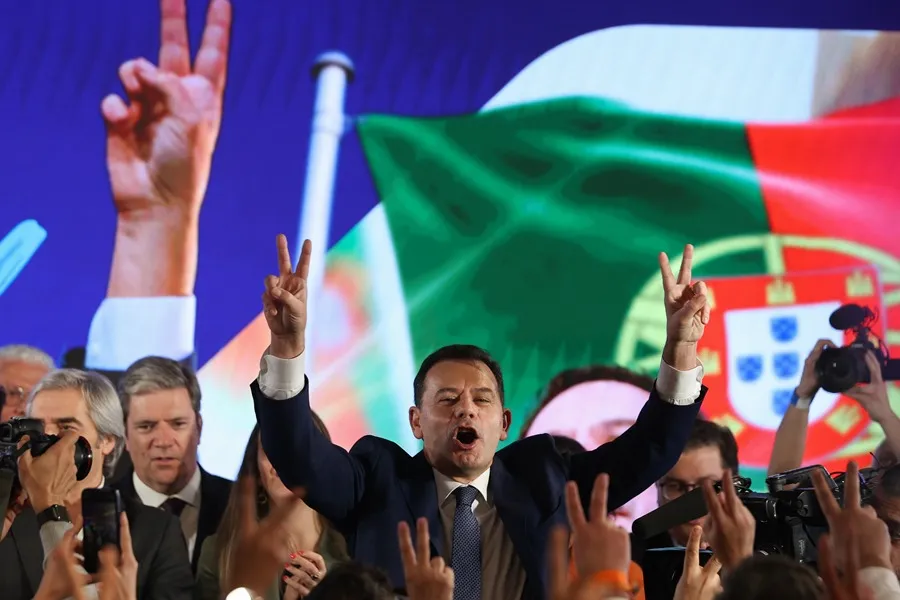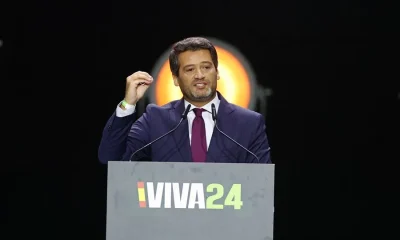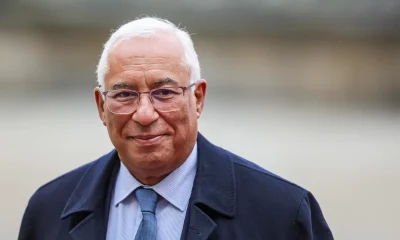International
The Parliament of Portugal begins its new legislature with a predominance of right-wing deputies

The Parliament of Portugal began a new legislature on Tuesday after the selections of March 10, with a majority of right-wing deputies, of which 80 are moderates of the winning coalition Democratic Alliance (AD), 50 ultras of the Chega party and 8 of Liberal Initiative (IL).
The deputies arrived early in the morning at the unicameral Assembly of the Republic (Parliament), where they greeted each other and chatted in a relaxed way.
In the seats of the Government sat the appointed Prime Minister, Luís Montenegro, leader of AD, and his collaborators, although the political leader has not yet announced his Executive, which will take office on April 2.
In the absence of a president of the chamber, the person in charge of opening the session was the head of the bench of the main formation that makes up the AD, the Social Democratic Party (PSD), Joaquim Miranda Sarmento, who was sitting next to Montenegro.
In a brief speech, Miranda Sarmento welcomed the 230 deputies, “who now begin functions, without forgetting those who served this Assembly and the country in the last legislature, the 15th legislature, and who now do not resume their place as deputies, and thank those who have ceased their functions for the work they carried out in favor of the country and the Portuguese.”
He wished that when this legislature ends, “in September 2028, the country could be better, the country could be more developed, richer, more prosperous and also more just.”
Despite the fact that Miranda Sarmento spoke of the end of the legislature in September 2028, the truth is that there are doubts that Montenegro and its future Government can complete it due to its tight victory against the Socialist Party, which has 78 seats, and its refusal to agree with Chega.
Miranda Sarmento gave way to the deputy who has been in Parliament for the longest time, António Filipe, of the Portuguese Communist Party, to preside over this session, waiting for the candidate proposed by the PSD to be president of the chamber, José Pedro Aguiar Branco, to be voted on Tuesday afternoon.
Filipe rose from his seat to occupy the position of president of Parliament and joked that he would never have imagined when he first entered the assembly at the age of 26 that he would one day be in this situation.
Also elected the two temporary secretaries for this session, Filipe went on to present the first draft resolution of this legislature, supported by all the parliamentary groups, to constitute a provisional commission that verifies the powers of the elected deputies.
After reading the names of the members of that commission, Filipe suspended the session until 3:00 p.m. local time (same time GMT), when the president of the chamber will be voted on.
After the absolute majority of the Socialist Party in the previous legislature, AD has 80 seats (78 of the PSD and 2 of the CDS-PP), followed by the socialists with 78 deputies and the far-right Chega, with 50.
The far-right formation was the party that grew the most in the elections of March 10, more than quadrupling its seats, which went from 12 to 50.
International
Claudia Sheinbaum: Operation Against ‘El Mencho’ Was Based on Pending Arrest Warrants

Mexico’s President Claudia Sheinbaum on Wednesday rejected claims that the military operation that resulted in the death of Nemesio Oseguera Cervantes, known as “El Mencho,” leader of the Jalisco New Generation Cartel (CJNG), was carried out under pressure from the United States government.
Sheinbaum explained that the deployment of federal forces was aimed at executing outstanding arrest warrants against Oseguera Cervantes, who was considered one of the most wanted criminals in both Mexico and the United States.
“That was not the objective (to ease pressure from the United States). It is very important, and I want to repeat it. This individual had an arrest warrant, or several,” Sheinbaum said, referring to the operation conducted on February 22.
According to the president, the initial goal was to capture Oseguera Cervantes, but military forces responded after coming under attack during the intervention.
“The operation was to detain him. The problem is that they were attacked — the Secretariat of National Defense — and they responded at that moment,” she said.
The president insisted that the action was not carried out in response to external demands, although she acknowledged intelligence cooperation with the United States.
“It was not done in any way because of pressure from the United States, not at all. Of course, there was intelligence information from the United States that was used specifically,” she concluded.
International
Spain Denies Any Agreement to Cooperate with U.S. Military in Iran Operations
International
White House Says Spain Agrees to Cooperate with U.S. Military After Trump Threatens Trade Embargo

White House Press Secretary Karoline Leavitt said Wednesday that Spain has agreed “in recent hours” to cooperate with the U.S. military, following President Donald Trump’s threat to impose a trade embargo on Madrid.
Trump had warned of potential commercial measures after Spain reportedly refused to allow the Pentagon to use facilities at Spanish military bases for operations related to Iran.
“With respect to Spain, I think you heard the president’s message yesterday loud and clear, and I understand that in recent hours they have agreed to cooperate with the United States military,” Leavitt said during a press briefing.
She added that the U.S. military is currently coordinating with its counterparts in Spain. However, the president expects broader support.
“The president expects that all of Europe, all of our European allies, of course, will cooperate in this important mission — not only for the United States, but also for Europe,” Leavitt said.
Her remarks came in response to questions about Spain’s position and its role as a U.S. ally amid rising tensions surrounding operations involving Iran.
-

 International4 days ago
International4 days agoIran Reports 201 Dead, 747 Injured After U.S. and Israeli Strikes
-

 International3 days ago
International3 days agoBrazil’s Supreme Court Rejects Bolsonaro’s Bid for House Arrest
-

 International3 days ago
International3 days agoAnti-ICE Billboard Campaign Targets Immigration Spending in 31 U.S. Cities
-

 International2 days ago
International2 days agoSpain’s Prime Minister to Address Nation Amid Trump’s Trade Threats
-

 International4 days ago
International4 days agoPope Leo XIV Urges End to ‘Spiral of Violence’ in Middle East
-

 Sin categoría5 days ago
Sin categoría5 days agoTrump: ‘We Think It’s True’ Amid Claims Iran’s Supreme Leader Was Killed
-

 International5 days ago
International5 days agoSecurity Council to Hold Emergency Meeting on Middle East Crisis
-

 International3 days ago
International3 days agoTrump Warns of ‘Major Wave’ of Attacks as Iran Conflict Escalates
-

 International23 hours ago
International23 hours agoWhite House Says Spain Agrees to Cooperate with U.S. Military After Trump Threatens Trade Embargo
-

 International3 days ago
International3 days agoMexico Calls for Immediate Probe After National Dies in ICE Custody
-

 International2 days ago
International2 days agoNew York Announces First 2,000 Seats in Universal 2-K Program
-

 International23 hours ago
International23 hours agoSpain Denies Any Agreement to Cooperate with U.S. Military in Iran Operations
-

 Central America23 hours ago
Central America23 hours agoNicaragua Held Responsible for Harassment of Opposition Prosecutor and His Family
-

 International3 days ago
International3 days agoBolivia Orders Three Investigations Into Deadly Military Plane Crash
-

 International2 days ago
International2 days agoWarner Bros. Developing First ‘Game of Thrones’ Movie With ‘Andor’ Writer
-

 Central America3 days ago
Central America3 days agoPanama Canal Monitoring Trade as Middle East Conflict Disrupts Shipping
-

 Central America2 days ago
Central America2 days agoGuatemala’s Attorney General Fails in Bid for Top Court Seat Amid Corruption Allegations
-

 International23 hours ago
International23 hours agoClaudia Sheinbaum: Operation Against ‘El Mencho’ Was Based on Pending Arrest Warrants



































